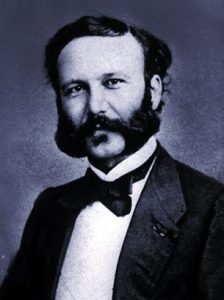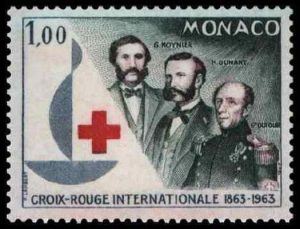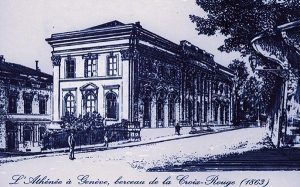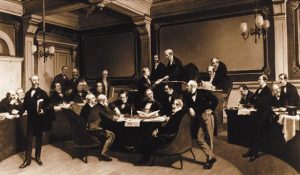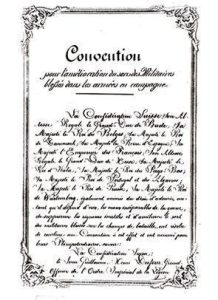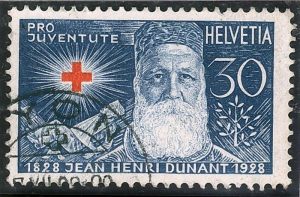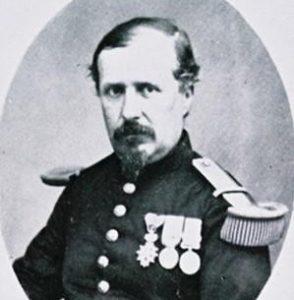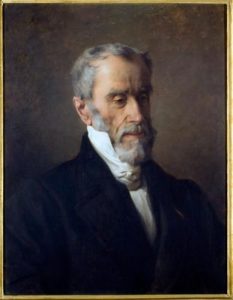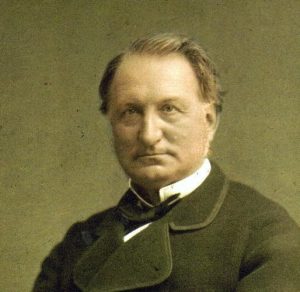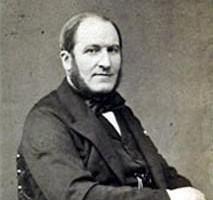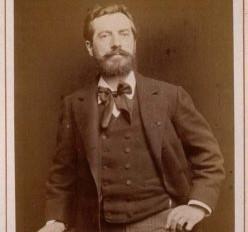He dreamed of living in Algeria
In 1853, Dunant visited North Africa, sent by the bank Lullin and Sautter, on assignment with the Genevan Company for the Development of Swiss Colonies. They had been granted a piece of land in Sétif from the French government, which had to be developed and where several hundred settlers had to be installed.
In 1856, he created his own colonial business in Algeria not far from St. Arnaud after having been granted his own territory. This was called the Financial and Industrial Company of Mons-Djemila Mills.
However he had considerable difficulty in developing it. It was not at all easy for him to obtain permission to use a waterfall which was essential to turn the wheels of the flour mills.
He visited Tunis in 1857, and wrote a book called An Account of the Regency in Tunis when he returned to Geneva. In it he gave many details about the geography and anthropology of the country.
His situation in Algeria grew worse and worse – in order to resolve his difficulties, or so he thought, he applied for and obtained French nationality.
In 1859, he decided to contact the Emperor Napoleon III personally.
Protestantism in Geneva at the time of the Revival
Henry Dunant was born on the 8th May 1848 in Geneva into a Calvinist family where social work was considered to be of great importance – an ideal which became a part of his life.
During this period of religious revival, the YMCA was founded and Dunant was its secretary and correspondent. He gave it his energetic support as well as most of his salary (he was an apprentice in the Lullin and Sautter bank in 1849).
During the summer of 1853, there were many meetings organized to found new chapters of the YMCA, both within French-speaking Switzerland and in France, and he visited Saint Etienne, Marseilles and Montpellier on an “apostolic mission”.
The creation of a Five-person Committee
Dunant decided to start writing a book A Memory of Solferino, which was published in 1862; in its last pages he expressed the main guidelines for the future Red Cross: The foundation of relief organizations to help nurse wounded soldiers in the case of war All relief should be on an international level and the principle of neutrality respected by all concerned.
On the 17th February the former Committee of Five Commission was renamed the Geneva Committee. In addition to Dunant, it was comprised of Gustave Moynier, General Dufour and two doctors: Théodore Maunoir and Louis Appia. Later it became the International Committee for Relief to the Wounded. This is now widely recognized as the origin of the future International Committee of the Red Cross, which would nominate Henry Dunant as its Secretary.
The main idea was to found relief organizations for the care of wounded soldiers in peacetime and to make sure that a special unit was added to armies on the battlefield which would comprise a corps of volunteer nurses wearing a distinctive symbol for their protection. This International Committee would exist in times of peace as well as in times of war.
The members of the Committee immediately sought the support of leading figures in Europe and indeed throughout the world.
The battle of Solferino
This is why, on the 24th June 1859, Dunant was near the battlefields of Solferino, where the Piemontese Army supported by French troops, fought against the Austrian Army.
The battle had been particularly horrific with a great many casualties. When Henry Dunant saw the battlefield strewn with the bodies of more than 40 000 dead or dying soldiers, his life took on a different course.
Based in Castiglione, he began to organize assistance with volunteers who were mostly women. He set up field hospitals, notably in the local cathedral Chiesa Maggiore, where he organized medical care for at least 10 000 wounded soldiers, whatever their nationality. He also managed to gain the release of Austrian doctors who had been held prisoner by the French and ensured that they help to take care of the wounded.
The Congress of Berlin (September 1863)
Although Dunant was asked to draw up a speech that was to be read at the International Congress of Charitable Organizations in Berlin, the latter was replaced by an international conference on statistics so it was never used. However, Dunant decided to go to Berlin.
During his stay he convinced several important leaders of the value of his Committee, notably the King of Prussia and the King of Saxony, whom he went to see in Dresden. In this way he impressed on people the importance of neutral organizations for the care of wounded soldiers. He also travelled to Austria and the Hesse.
The Conference of Geneva (October 1863)
In Genf wird eine internationale Konferenz organisiert um „die Mittel zu untersuchen, wie man die Mangelhaftigkeit des Gesundheitsdienstes in den Armeen bei Feldzügen beheben kann“. Die Schlussfolgerungen dieser Konferenz sind äußerst positiv und entsprechen den Wünschen, die Dunant geäußert hat. Die Regierungen werden aufgefordert:
- diese Komitees unter ihren Schutz zu stellen,
- das Thema der Neutralität zu respektieren,
- ein besonderes Kennzeichen einzuführen: es wird das rote Kreuz auf weißem Grund.
A diplomatic conference was organized on the 22nd August 1864
Die „Genfer Konvention“ für die Verbesserung des Schicksals der Verwundeten im Fall einer Schlacht lässt die Hauptvorschläge, die zwei Jahre zuvor in „Eine Erinnerung an Solferino“ niedergelegt worden waren, in das internationale Recht einfließen.
Der Vertrag bestimmt, dass die Krankenwagen, Krankenhäuser und ihr Personal neutral sein müssen und die Verwundeten unparteilich versorgt werden.
More difficulties in Algeria
In Algerien bemüht sich Dunant ohne Erfolg, eine Genehmigung für einen zweiten Wasserfall zu erhalten, den er für die Bewirtschaftung seiner Ländereien braucht. Doch verliert er nicht den Mut: 1865 erwirbt er Steinbrüche in Felfela und versucht mit allen Mitteln, die Mühlen von Djemila zu retten, indem er sie in eine gesündere Gesellschaft integriert. Aber die finanzielle Lage erweist sich als katastrophal und Dunants Gesellschaft geht in Konkurs.
Er wird vom Genfer Handelsgericht für betrügerischen Bankrott verurteilt.
In 1867, Dunant left Geneva for Paris
Eine Meinungsverschiedenheit mit Moynier wird immer fühlbarer. Dunant reicht seinen Rücktritt vom Posten des Sekretärs der Internationalen Hilfskomitees für die Verwundeten ein. In einem Brief gibt Moynier Henri Dunant klar zu verstehen, dass seine Abwesenheit von Genf ihm nicht länger erlaubt, an den Arbeiten des Komitees vom Roten Kreuz teilzunehmen.
Der Bruch ist vollzogen. Dunant sieht sich für immer vom Internationalen Hilfskomitee für die Verwundeten usgeschlossen. Er wird auch aus dem Christlicher Verein junger Männer (CVJM) ausgeschlossen.
In seinen Erinnerungen sagt er, dass er sich „in einem Zustand der Betrübnis, der Verzweiflung, Not und Hungersnot befindet, den sich kein Mensch vorstellen kann.“
In the 1870 Franco-Prussian War, Dunant took part in many activities
Er gründet die „Internationale Vorsorgegesellschaft zugunsten der Bürger unter den Waffen“, die als Unterstützung der Hilfsgesellschaft für die Verwundeten angekündigt wird; er gründet die Gesellschaft für Allgemeine Hilfeleistung, dann die Allgemeine Allianz für Ordnung und Zivilisation.
Mit seinem Freund, dem Doktor Chédron, entwickelt er die Herstellung eines revolutionären Verbandes aus Leinwandfasern, die in Eisenchlorid getaucht werden.
Er wird auch aktiv in der Gründung von Bibliotheken.
1872 unternimmt er nochmals den Versuch, eine Aktion zugunsten der Kriegsgefangenen ins Leben zu rufen und zwei Jahre später wird er zum internationalen Sekretär der Gesellschaft zur Verbesserung der Bedingungen der Kriegsgefangenen ernannt, einer Gesellschaft, die in Paris gegründet wurde, und für die er auch mehrmals nach England eingeladen wird.
Aber ab diesem Datum lässt sich bemerken, dass er sich nach und nach aus dem öffentlichen Leben zurückzieht.
From 1874 to 1886, Dunant led a lonely life, beset by financial worries
Nach 1881 verreist er noch recht gern , manchmal nach Stuttgart, wo er Freunde hat, nach Rom oder Basel, aber seine Reisen werden seltener und 1888 lässt er sich schließlich in Heiden in der Schweiz nieder, im Appenzellerland, zunächst in der Pension Paradies im Sommer und im Hotel Freihof im Winter; danach, ab April 1892 zieht er sich in das Krankenhaus der Stadt zurück, das von Doktor Hermann Altherr geleitet wird.
The Nobel Prize (1901)
Das Nobelkomitee des norwegischen Parlaments verleiht Henri Dunant den Freidensnobelpreis 1901.
Henri Dunant stirbt am 30. Oktober 1910 in Heiden im Alter von 82 Jahren.

